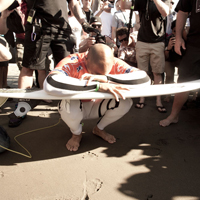Something of an oxymoron came to our attention Monday, June 1, which we believe deserves a shout-out for those working in youth culture markets. While at the Los Angeles Convention Center attending the press conferences for E3, the world’s largest video gaming expo, starting with Microsoft, including none other than the actual Beatles followed by Tony Hawk hawking his latest game, I was also reading tweets from the yPulse Mashup youth conference, which was going on at the same time in San Francisco. While it’s unfortunate that both youth-oriented events have the same dates (which in-and-of-itself was a bit ironic), I thought that what Doug Sweeney, VP, from Levi Strauss had to say (at yPulse) in his lecture “Creating Relevance with Today’s Youth Culture” was actually a good example of being slightly off the mark. Here’s why:
Understand, I got much of this from tweets from yPulsemashup and other attendees at the conference, but the gist of what Mr. Sweeney was saying was that to reach youth culture, you need to 1) Authentically insert your brand into pop culture and make it feel like it came from the marketplace; 2) Conduct a 2-way dialogue; 3) Be nimble/experimental in your planning to reach this market; 4) Have a multi-faceted approach (events to sponsor, posters, video); and 5) Create content for your own brand and for others to react to.
Generally, I would say that this is all good advice. Except for where Levi Strauss chose to interject their brand and the subject from which they created their content around, and a few other oxymoronic steps. First, the biggest bubble burst came when Sweeney claimed that “powersliding” or sliding down rails and doing tricks (preferably in your Levi jeans) is the next “extreme sport” and was actually around in the 70’s. To start, this shows hints of being outdated simply by using the word “extreme” next to the word “sport” and secondly, sliding down rails on ones ass isn’t a “sport” or even all that cool, unless you’re 8 or have a skateboard under your feet.
But it gets worse. By creating hype around this new sport, including YouTube videos that are borderline stupid, they are going against their own concept of “inserting your brand into pop culture and making it seem like it’s coming from the market” and instead are trying to own a trend by creating a “sport” (whether it’s real or not) that focuses on themselves. How authentic. (Please read our Manifesto.)
The amount of tweets from action sports-related marketing managers after the “powersliding” segment was quite interesting as most noted that powersliding is not going to be the next inline phenom, or even Parkour, no matter who “makes” it. Some thought he had to be joking (about powersliding being a sport) and even if so, the viral concept isn’t nearly as cool as say, WESC’s street-horsing campaign. But that’s another story.
Secondly, Levi’s is using BMX to help create brand cred and authenticity. While supporting this sport and sponsoring riders (and paying all of their health insurance) is definitely a good thing, resulting in team rider brand loyalty, if a brand wants to insert itself into youth culture via sports, BMX is not necessarily the “entry” sport for non-endemic brands. First, based on our data, while somewhat popular, BMX is far less popular than skateboarding and many other sports. And with females actually being larger denim brand buyers than males, going for a seriously male-oriented sport (although girls are getting into BMX), is not the best “crossover” genre one could enter into, like say urban dance, or, once again, skateboarding.
To Levi’s credit, their viral “jean jump” YouTube clip was genius, but it could have been part of their “experimental” planning. But powersliding in order to “authentically insert” where Levi’s is the supposed focus? BMX as the entry to youth markets? Here are examples of getting some things right, but not the rest. Being just a little bit off like this can make all the difference when it comes to youth culture, and at the very worst, cause brand backlash.
Ironically, I never did get the tweet when someone in the audience asked how much of a marketing budget they were spending on this.
Back to E3 now for the Ubisoft conference and James Cameron. More stories from the show floor to come.
Note: Overall, the yPulse Mashup conference gained great reviews and much was accomplished, or so was tweeted, including prime opportunities for networking and learning new ways to reach youth culture markets. The organizers and sponsors should be commended on their efforts for bringing fresh ideas forward.


